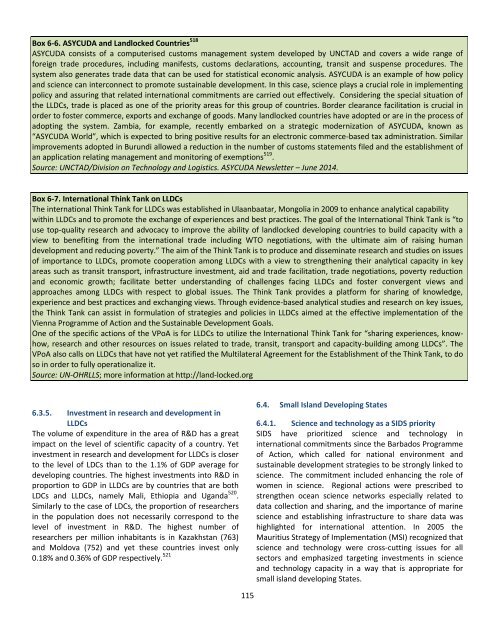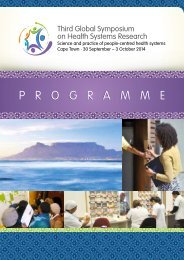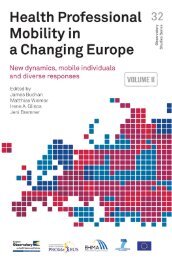1HlG51J
1HlG51J
1HlG51J
Create successful ePaper yourself
Turn your PDF publications into a flip-book with our unique Google optimized e-Paper software.
Box 6-6. ASYCUDA and Landlocked Countries 518ASYCUDA consists of a computerised customs management system developed by UNCTAD and covers a wide range offoreign trade procedures, including manifests, customs declarations, accounting, transit and suspense procedures. Thesystem also generates trade data that can be used for statistical economic analysis. ASYCUDA is an example of how policyand science can interconnect to promote sustainable development. In this case, science plays a crucial role in implementingpolicy and assuring that related international commitments are carried out effectively. Considering the special situation ofthe LLDCs, trade is placed as one of the priority areas for this group of countries. Border clearance facilitation is crucial inorder to foster commerce, exports and exchange of goods. Many landlocked countries have adopted or are in the process ofadopting the system. Zambia, for example, recently embarked on a strategic modernization of ASYCUDA, known as“ASYCUDA World”, which is expected to bring positive results for an electronic commerce-based tax administration. Similarimprovements adopted in Burundi allowed a reduction in the number of customs statements filed and the establishment ofan application relating management and monitoring of exemptions 519 .Source: UNCTAD/Division on Technology and Logistics. ASYCUDA Newsletter – June 2014.Box 6-7. International Think Tank on LLDCsThe international Think Tank for LLDCs was established in Ulaanbaatar, Mongolia in 2009 to enhance analytical capabilitywithin LLDCs and to promote the exchange of experiences and best practices. The goal of the International Think Tank is “touse top-quality research and advocacy to improve the ability of landlocked developing countries to build capacity with aview to benefiting from the international trade including WTO negotiations, with the ultimate aim of raising humandevelopment and reducing poverty.” The aim of the Think Tank is to produce and disseminate research and studies on issuesof importance to LLDCs, promote cooperation among LLDCs with a view to strengthening their analytical capacity in keyareas such as transit transport, infrastructure investment, aid and trade facilitation, trade negotiations, poverty reductionand economic growth; facilitate better understanding of challenges facing LLDCs and foster convergent views andapproaches among LLDCs with respect to global issues. The Think Tank provides a platform for sharing of knowledge,experience and best practices and exchanging views. Through evidence-based analytical studies and research on key issues,the Think Tank can assist in formulation of strategies and policies in LLDCs aimed at the effective implementation of theVienna Programme of Action and the Sustainable Development Goals.One of the specific actions of the VPoA is for LLDCs to utilize the International Think Tank for “sharing experiences, knowhow,research and other resources on issues related to trade, transit, transport and capacity-building among LLDCs”. TheVPoA also calls on LLDCs that have not yet ratified the Multilateral Agreement for the Establishment of the Think Tank, to doso in order to fully operationalize it.Source: UN-OHRLLS; more information at http://land-locked.org6.3.5. Investment in research and development inLLDCsThe volume of expenditure in the area of R&D has a greatimpact on the level of scientific capacity of a country. Yetinvestment in research and development for LLDCs is closerto the level of LDCs than to the 1.1% of GDP average fordeveloping countries. The highest investments into R&D inproportion to GDP in LLDCs are by countries that are bothLDCs and LLDCs, namely Mali, Ethiopia and Uganda 520 .Similarly to the case of LDCs, the proportion of researchersin the population does not necessarily correspond to thelevel of investment in R&D. The highest number ofresearchers per million inhabitants is in Kazakhstan (763)and Moldova (752) and yet these countries invest only6.4. Small Island Developing States1156.4.1. Science and technology as a SIDS prioritySIDS have prioritized science and technology ininternational commitments since the Barbados Programmeof Action, which called for national environment andsustainable development strategies to be strongly linked toscience. The commitment included enhancing the role ofwomen in science. Regional actions were prescribed tostrengthen ocean science networks especially related todata collection and sharing, and the importance of marinescience and establishing infrastructure to share data washighlighted for international attention. In 2005 theMauritius Strategy of Implementation (MSI) recognized thatscience and technology were cross-cutting issues for allsectors and emphasized targeting investments in scienceand technology capacity in a way that is appropriate forsmall island developing States.




